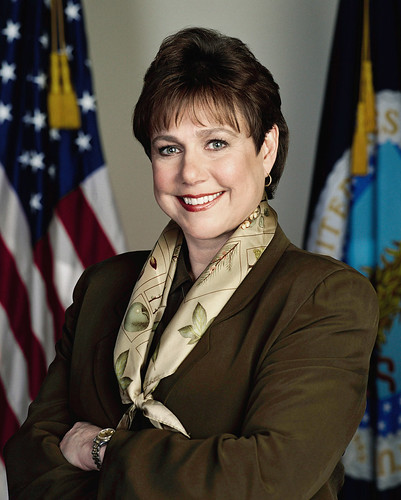
As part of our Women’s Week blog series, Ann Veneman shares her perspective as the first and only woman who has held the title of Secretary of Agriculture. A lawyer by training, Ann grew up in a small rural community in California and has dedicated her career to domestic and international food and agriculture issues. During her tenure as Secretary, American agriculture saw record farm income, record agricultural exports and the creation of stronger pest and disease protection systems for the country.
Ann has held various positions at USDA and in state government, including Deputy Secretary, Deputy Undersecretary for International Affairs, Associate Administrator of the Foreign Agricultural Service, and Secretary of the California Department of Food and Agriculture. She served as the Executive Director of the United Nations Children’s Fund (UNICEF) from 2005-2010 and is a member of the Council on Foreign Relations, The Trilateral Commission, the National 4-H Council Board of Trustees and serves as an advisor to the Bipartisan Policy Center. In 2009, Ann was named to Forbes Magazine’s List of The World’s 100 Most Powerful Women.
How do you start your day?
I travel a great deal for various board meetings and conferences so there is not too much routine in my daily schedule. I generally begin my day with a review of the news and emails. I also exercise in the mornings when I don't have early morning meetings.
In your experience, what role do you see women playing in global food security?
Women are key to long term global food security and they are critical at every part of the global food chain. It is estimated that in the developing world, women are 70% of the small holder farmers. According to FAO, women in sub-Saharan Africa and Latin American and the Caribbean produce up to 80 % of the basic food stuffs.
Increasingly women are policy makers in government and decision makers in companies, but it is not enough. More needs to be done to engage and promote women.
What do you think is missing from the conversation when we don’t have women at the table and in leadership roles such as Secretary of Agriculture, CEOs of Fortune 500 companies, heads of 4-H and FFA chapters etc.?
Women bring diversity of thought and ideas to any organization and to any conversation.
It is encouraging that there are more women leading food related traded associations and at the helm of food and agriculture related businesses including Campbell Soup Company, Pepsi, DuPont, and Mondelez, among others. They are increasingly on food related corporate boards, and in top roles in companies. A woman is now heading 4-H and there are several women Deans of Agriculture in Universities.
I have met many women Ministers of Agriculture from around the world and others who are in top food policy, trade and related positions.
Opportunities for women throughout the food chain continue to expand, but more must be done to overcome barriers to advancement.
What has been your most memorable experience, either as Secretary of Agriculture or in any other official role?
I am often asked this question, and it is a difficult one. I feel fortunate to have had many opportunities and memorable experiences. The most difficult and memorable day while I was at USDA is a day that everyone will always remember, and that is September 11, 2001. Throughout the government, we had to reassess programs and processes to consider potential risks and vulnerabilities to help ensure the protection of our food supply. We had several other challenging crises during my tenure as Secretary of Agriculture, including the discovery of the first case of Mad Cow Disease (BSE) in 2003. I was honored to work beside so many dedicated, career USDA staff, who helped lead our agency successfully through the many policy initiatives we spearheaded.
What I enjoyed most was traveling to states across the country, visiting with farmers and their families, seeing the innovations in agriculture that are literally helping feed the world and talking with young people about their futures. I initiated a mentor program called Leaders of Tomorrow and whenever I traveled a 4-Her or FFA student would join me for the day and be part of our work.
During my time as Executive Director of UNICEF, I traveled throughout the developing world to see firsthand the tremendous work being done to support and protect the world’s most vulnerable children. I will never forget looking into the eyes of young children in southern Africa who had been orphaned by AIDS or talking with women who had been brutally treated in conflict zones where rape is often used as a weapon of war.
I saw many children suffering from malnutrition around the world. It is critical that the focus be not just on food security, but nutrition security.
In seven words or less, what is some advice you would offer your fellow women in agriculture?
Live a life full of purpose and passion.
